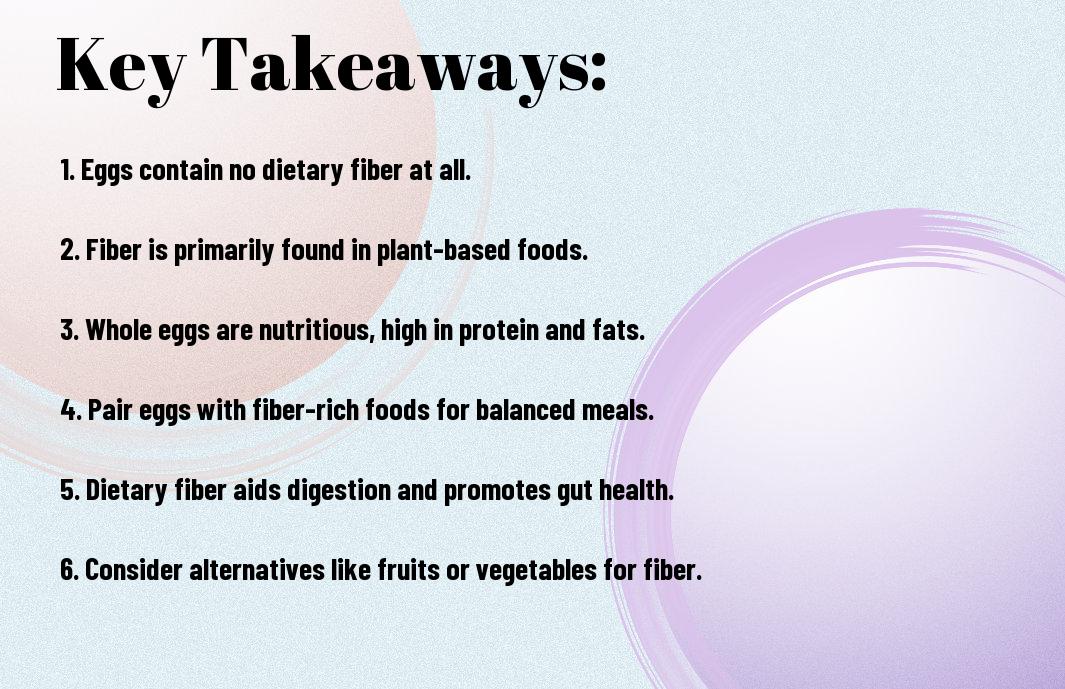There’s a common misconception that eggs are a good source of dietary fiber, but the reality is quite different. In this post, you’ll learn about the fiber content of eggs and explore how they fit into a balanced diet. While they provide crucial nutrients like protein and healthy fats, you might be surprised to find that eggs contain virtually no fiber at all. Let’s examine into the reasons why incorporating fiber-rich foods is important for your health and how eggs can complement those sources in your meals.

Key Takeaways:
- Eggs do not contain fiber.
- Dietary fiber is primarily found in plant-based foods.
Understanding Fiber
Your knowledge of fiber is vital for maintaining a healthy diet. Fiber is a type of carbohydrate that the body cannot digest, and it plays a vital role in promoting digestive health, managing weight, and lowering the risk of chronic diseases. By incorporating adequate fiber into your diet, you can enhance your overall well-being and improve bodily functions.
Definition of Fiber
Fiber is a naturally occurring substance found in plant foods that helps support digestion and overall health. It is categorized into two main types: soluble and insoluble, each contributing differently to your nutritional needs. Soluble fiber absorbs water and forms a gel-like substance, while insoluble fiber adds bulk to your stool and aids in moving food through the digestive tract.
Types of Fiber
Fiber comes in two primary types that play different roles in your health. These include:
- Soluble Fiber: Dissolves in water; helps lower cholesterol and regulate blood sugar levels.
- Insoluble Fiber: Does not dissolve in water; promotes regularity and prevents constipation.
| Type | Characteristics |
|---|---|
| Soluble Fiber | Helps lower cholesterol and manage blood sugar levels. |
| Insoluble Fiber | Aids in digestion and prevents constipation. |
| Sources | Oats, beans, fruits, vegetables. |
| Health Benefits | Supports heart health and digestive function. |
| Daily Recommendation | 25-30 grams for adults. |
Also, understanding the types of fiber aids in making healthier food choices. Incorporating a mix of both soluble and insoluble fiber into your diet can greatly enhance your well-being. Look for foods rich in fiber to ensure you reap the benefits:
- Fruits like apples and berries for soluble fiber.
- Vegetables like carrots and celery for insoluble fiber.
| Food | Type of Fiber |
|---|---|
| Oats | Soluble Fiber |
| Whole Wheat | Insoluble Fiber |
| Legumes (Beans) | Soluble Fiber |
| Broccoli | Insoluble Fiber |
| Apples | Soluble Fiber |

Nutritional Composition of Eggs
There’s a rich nutritional profile in eggs that makes them a staple in many diets. They are not only high in protein but also provide vital fats, vitamins, and minerals. A single large egg generally contains around 70 calories, with various nutrients packaged neatly within its shell, making it a versatile food choice for your meals. This combination of nutrients supports your overall health, aiding in muscle growth and repair, as well as providing energy for daily activities.
Macronutrients in Eggs
Around six grams of protein is contained in each large egg, which is vital for your body’s growth and repair. In addition to protein, eggs provide a small amount of carbohydrates, typically less than one gram, and approximately five grams of fat. The majority of the fat is unsaturated, which is beneficial for heart health, making eggs a balanced choice for incorporating macronutrients into your diet.
Micronutrients in Eggs
To understand the benefits of eggs, explore the wealth of micronutrients they offer. Each egg is a source of various vitamins and minerals, including vitamin A, vitamin D, vitamin B12, riboflavin, selenium, and choline. These micronutrients play significant roles in supporting your immune system, promoting eye health, and aiding in metabolism.
Macronutrients in eggs are complemented by an impressive array of micronutrients. For instance, vitamin D not only supports bone health but also plays a role in mood regulation. Choline is vital for brain function and cell membrane integrity, contributing to mental clarity and cognitive health. Additionally, selenium acts as a powerful antioxidant, supporting your body’s defense mechanisms. By including eggs in your diet, you can benefit from both the macronutrient and micronutrient profile they offer, enhancing your overall nutritional intake.
Fiber Content in Eggs
Once again, it’s important to note that eggs are not high in fiber. A typical large egg contains virtually no fiber at all. If you’re looking for ways to boost your fiber intake at breakfast, consider incorporating fiber-rich foods like fruits, whole grains, or vegetables. For inspiration, check out 25 High-Fiber Breakfast Ideas for a Healthy Stomach.
Are Eggs Naturally High in Fiber?
An egg is primarily a source of protein and healthy fats, but it doesn’t offer any dietary fiber. If you are focusing on increasing your fiber consumption, you will need to look beyond eggs for those nutrients.
Comparison with Other Foods
Across various food options, eggs stand out for their excellent protein content but fall flat on fiber. Here’s a quick comparison:
| Food Item | Fiber Content (grams) |
| Large Egg | 0 |
| Avocado (1 medium) | 9 |
| Oats (1 cup, cooked) | 4 |
| Chia Seeds (1 oz) | 10 |
Hence, if you compare the fiber content of eggs to other foods, it’s clear that eggs do not contribute to your dietary fiber intake. Opting for fiber-rich foods alongside your eggs can help achieve a balanced, nutritious meal.
| Food Item | Fiber Content (grams) |
| Broccoli (1 cup, cooked) | 5 |
| Whole Wheat Bread (1 slice) | 2 |
| Quinoa (1 cup, cooked) | 5 |
Health Benefits of Fiber
After incorporating fiber into your diet, you may notice numerous health benefits that contribute to overall well-being. Fiber aids in proper digestion, supports a healthy gut microbiome, and helps in weight management. Additionally, a fiber-rich diet can contribute to lower cholesterol levels and improved blood sugar control, which plays a vital role in reducing your risk of chronic diseases. By focusing on fiber, you can promote important bodily functions and cultivate long-term health benefits.
Digestion and Gut Health
Beside promoting regular bowel movements, fiber is important for maintaining a healthy gut environment. It acts as a prebiotic, feeding beneficial gut bacteria that aid digestion. A fiber-rich diet fosters better nutrient absorption while reducing your chances of developing gastrointestinal issues, such as constipation or irritable bowel syndrome (IBS). Embracing fiber in your meals can help enhance your digestive health over time.
Heart Health and Disease Prevention
Above all, you should know that fiber plays a significant role in heart health and disease prevention. A diet rich in fiber can lower cholesterol levels and reduce blood pressure, thus lowering your risk of heart disease. Fiber also helps regulate blood sugar levels, making it vital for preventing type 2 diabetes.
Heart health is a priority in maintaining your overall well-being, and fiber contributes significantly to this aspect of health. By consuming soluble fiber, you can help your body remove excess cholesterol, leading to improved heart functioning. Regular fiber intake not only stabilizes blood sugar levels but also reduces inflammation, which is vital for preventing cardiovascular diseases. As you increase your fiber consumption, you’re taking important steps toward safeguarding your heart and enhancing your overall health.
Dietary Sources of Fiber
All sources of dietary fiber come from plant-based foods. These include fruits, vegetables, legumes, nuts, seeds, and whole grains. Fiber plays an necessary role in digestion and overall health, helping you maintain a balanced diet. By incorporating a variety of these foods into your meals, you can easily increase your fiber intake and enjoy its numerous benefits for your body.
Whole Foods Rich in Fiber
Below are some excellent whole foods that are rich in fiber: beans, lentils, oats, chia seeds, quinoa, apples, pears, and leafy greens. These foods not only provide you with fiber but also come packed with necessary vitamins, minerals, and antioxidants, enhancing your overall nutritional profile.
Incorporating Fiber into Your Diet
On your journey to a fiber-rich lifestyle, start by gradually adding high-fiber foods to your daily meals. You can swap refined grains for whole grains, incorporate legumes into salads or soups, and snack on fruits and vegetables throughout the day.
In fact, increasing your fiber intake can be an enjoyable process. Try experimenting with new recipes that feature legumes or whole grains, add more fruits and veggies to your smoothies, or replace traditional snacks with nuts and seeds. Keeping a variety of fiber-rich foods on hand makes it easier for you to maintain a well-rounded diet, promote digestive health, and feel satisfied for longer periods after meals.
The Role of Eggs in a Balanced Diet
Not only are eggs a rich source of high-quality protein, but they also provide crucial vitamins and minerals that contribute to overall health. Including eggs in your diet allows you to enjoy versatility in meal preparation while ensuring you are fueling your body with important nutrients. When incorporated into a balanced diet, eggs can support muscle development, brain function, and overall wellness, making them a valuable addition to your daily meals.
Egg Consumption Recommendations
Above the age of 19, the American Heart Association suggests that you can safely consume up to one egg per day as part of a heart-healthy diet. However, your individual health conditions and dietary needs may affect these recommendations, so it’s always wise to talk to a healthcare professional about your specific situation.
Combining Eggs with High-Fiber Foods
Eggs provide you with a solid protein base, which can be deliciously complemented by incorporating high-fiber foods into your meals. By pairing eggs with items like whole grain toast, leafy greens, or avocado, you enhance both the nutrient density and fiber content of your dishes.
With this combination, you not only make your meals more filling but also balance the macronutrients effectively. A breakfast of scrambled eggs served on whole grain bread with spinach or a frittata loaded with vegetables can keep you satisfied longer, aiding digestion and promoting a healthy gut. This approach allows you to meet your daily fiber intake recommendations while enjoying the benefits of both protein from eggs and fiber from your chosen accompaniments.
Summing up
With this in mind, you should know that eggs are not high in fiber, as they contain virtually none. While they are a great source of protein and necessary nutrients, you need to complement your meals with high-fiber foods for a balanced diet. Incorporate foods such as fruits, vegetables, legumes, and whole grains to meet your fiber needs effectively. For more insight on dietary fiber, consider checking out this resource on 31 High-Fiber Foods You Should Eat.
FAQ
Q: Are eggs high in fiber?
A: No, eggs are not high in fiber. In fact, eggs contain no dietary fiber at all. They are primarily composed of protein and fats, making them a good source of nutrients but not a source of fiber.
Q: Why is fiber important in a diet?
A: Fiber is important for various reasons. It aids in digestion, helps maintain bowel health, lowers cholesterol levels, and can contribute to a feeling of fullness. A diet high in fiber can also help manage blood sugar levels and reduce the risk of diseases such as diabetes and heart disease.
Q: What foods are rich in fiber?
A: Foods that are rich in fiber include fruits (such as apples, bananas, and berries), vegetables (like broccoli, carrots, and leafy greens), legumes (such as beans, lentils, and chickpeas), whole grains (like oats, brown rice, and quinoa), and nuts and seeds. Incorporating these foods into your diet can help increase your fiber intake.
Q: Can I get enough fiber if I eat eggs regularly?
A: While eggs are nutritious, they should not be relied upon as a source of fiber. If you consume eggs regularly, it is important to include other high-fiber foods in your diet to meet your daily fiber requirements. The recommended daily fiber intake is about 25 grams for women and 38 grams for men.
Q: How can I increase my fiber intake in meals that include eggs?
A: To increase fiber intake while enjoying eggs, consider adding high-fiber ingredients to your egg dishes. For example, you can include vegetables like spinach, tomatoes, and bell peppers in an omelette or serve eggs alongside whole grain toast or avocado. You can also incorporate legumes by adding beans to a breakfast burrito or salad.



